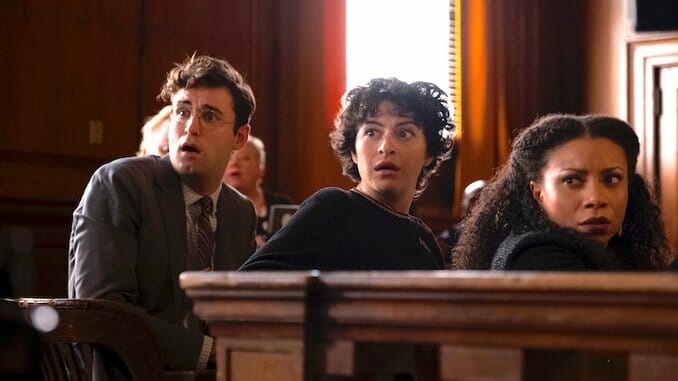Search Party Season 3: This Parody of Privileged Youths Has Lost Its Luster
Photo Courtesy of HBO Max
Despite picking up just after the events of its previous season, the world that Search Party Season 3 enters on HBO Max, three years after it originally premiered on TBS, is very different. The satirical send-up of hipster culture feels like a relic, which the show addresses in a short exchange early on when one attorney says to another, “people love to hate millennials!” “Actually, I think that kind of talk has died down ….” But what makes Search Party’s third season—which deals with the legal fallout of the four friends being arrested for murder—feel particularly uncomfortable is watching these four white, privileged young people gently glide through the criminal justice system using money and connections while being treated with kid gloves. For all of the series’ social commentary, that is one thing that isn’t addressed as being anything other than ordinary.
Search Party made a choice at the end of its first season that changed it from a clever show that melded together ennui and influencer culture to something much darker and more emotionally tangled. When a supposed comedy introduces murder, the trajectory drastically changes (see also Dead to Me and Run). What that means in almost all cases is that whatever the show was doing before no longer matters: It’s now all about the murder. It’s why I didn’t feel as positively towards Search Party Season 2—which was all about the cover-up—and was uncertain going in to Season 3. At this point, we know that the four are horribly guilty, but the show only exists if they get away with it. It leads to wild swings in tone that leaves both its comedy and drama feeling half-baked.
Season 3 starts with Dory (Alia Shawkat) being arrested, alongside (eventually) her cohorts. Beyond Dory’s more dramatic storyline, the first few episodes (out of 10, all available for review) have that zany, sardonic, and occasionally wonderfully insightful comedy that made Season 1 so good. And that is largely all carried by its great cast. Portia (Meredith Hagner) and Elliot (John Early) remain the best, and John Reynolds brings much-needed heart to the proceedings as Drew. But the new attorney additions to the cast are exceptional, despite the familiar trial setup: Michaela Watkins’ exasperated prosecutor, Louis Anderson’s lumbering lawyer, and most especially Shalita Grant as Cassidy, a vocal-fry extraordinaire who also serves as Dory’s defense attorney (with Dory as her first client).
-

-

-

-

-

-

-

-

-

-

-

-

-

-

-

-

-

-

-

-

-

-

-

-

-

-

-

-

-

-

-

-

-

-

-

-

-

-

-

-








































